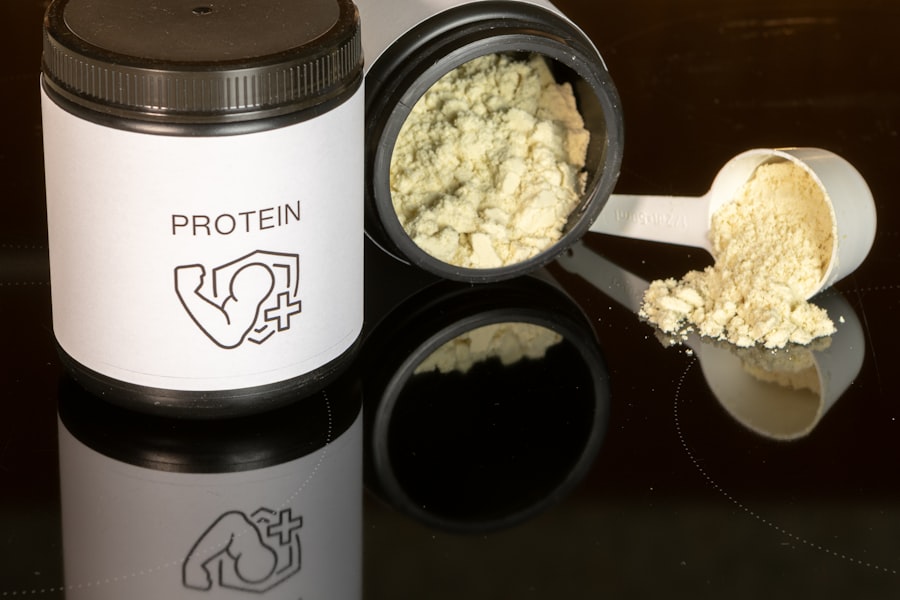As you age, the importance of protein in your diet cannot be overstated. Protein plays a crucial role in maintaining your overall health and well-being, especially as your body undergoes various changes. It is essential for repairing tissues, producing enzymes and hormones, and supporting immune function.
As you grow older, your body’s ability to synthesize protein diminishes, making it even more vital to ensure you are consuming adequate amounts. A diet rich in protein can help you maintain muscle mass, support bone health, and promote a healthy metabolism, all of which are critical for aging gracefully. Moreover, protein is not just about muscle maintenance; it also plays a significant role in your daily energy levels and cognitive function.
As you age, you may find that your energy levels fluctuate more than they used to. Incorporating sufficient protein into your meals can help stabilize your energy throughout the day, allowing you to engage in activities you enjoy. Additionally, protein-rich foods can help keep you feeling full longer, which can be beneficial for weight management.
By prioritizing protein in your diet, you are setting the foundation for a healthier, more vibrant life as you age.
Key Takeaways
- Protein is essential for a healthy aging diet, supporting muscle maintenance, bone health, weight management, cognitive function, and sustained energy throughout the day.
- Protein-packed breakfasts provide numerous benefits for older adults, including improved muscle maintenance, weight management, sustained energy, and cognitive health.
- Top protein sources for breakfast include eggs, Greek yogurt, cottage cheese, nuts, seeds, and lean meats such as turkey or chicken.
- Easy and delicious protein-packed breakfast ideas include Greek yogurt parfaits, vegetable omelets, oatmeal with nuts and seeds, and protein smoothies.
- Incorporating protein into your breakfast routine can be as simple as adding nuts, seeds, or Greek yogurt to your morning meal, providing a balanced and nutritious start to the day.
Benefits of Protein-Packed Breakfasts for Older Adults
Starting your day with a protein-packed breakfast can have profound benefits for your overall health and well-being. For older adults, breakfast is often considered the most important meal of the day, and when it is rich in protein, it can set a positive tone for the rest of the day. Consuming protein in the morning can help regulate your appetite, making it easier to avoid unhealthy snacking later on.
This is particularly important as you age, as maintaining a healthy weight becomes increasingly crucial for preventing chronic diseases. In addition to appetite regulation, a protein-rich breakfast can enhance your cognitive function. Studies have shown that consuming protein in the morning can improve focus and concentration throughout the day.
This is especially beneficial for older adults who may experience cognitive decline. By fueling your brain with the right nutrients from the start of the day, you are better equipped to tackle tasks and engage in social interactions, ultimately enhancing your quality of life.
Top Protein Sources for Breakfast

When it comes to breakfast, there are numerous protein sources you can incorporate into your meals. Eggs are one of the most versatile and nutrient-dense options available. They are not only rich in protein but also contain essential vitamins and minerals that support overall health.
Whether scrambled, poached, or made into an omelet with vegetables, eggs can be a delicious way to start your day. Greek yogurt is another excellent source of protein that can easily be added to your breakfast routine. It is thicker and creamier than regular yogurt and contains nearly double the amount of protein.
You can enjoy it plain or mix it with fruits and nuts for added flavor and nutrition. Additionally, cottage cheese is a fantastic option that is high in protein and low in fat. Pairing it with fresh fruit or whole-grain toast can create a satisfying breakfast that keeps you full until lunchtime.
Easy and Delicious Protein-Packed Breakfast Ideas
| Breakfast Idea | Protein Content (g) | Calories |
|---|---|---|
| Greek Yogurt Parfait | 20 | 250 |
| Scrambled Eggs with Spinach | 25 | 300 |
| Protein Smoothie | 30 | 280 |
| Quinoa Breakfast Bowl | 15 | 320 |
Creating a protein-packed breakfast doesn’t have to be complicated or time-consuming. One simple idea is to make a smoothie using Greek yogurt or protein powder as a base. You can blend it with your favorite fruits and leafy greens for a nutritious start to your day.
This option is not only quick but also allows for endless variations based on your taste preferences. Another easy breakfast idea is to prepare overnight oats with chia seeds and almond milk. Chia seeds are an excellent source of plant-based protein and fiber, making them a perfect addition to your morning routine.
Simply mix rolled oats with almond milk, chia seeds, and your choice of toppings such as nuts or berries, and let it sit overnight in the fridge. In the morning, you’ll have a delicious and filling breakfast ready to go.
How to Incorporate Protein into Your Breakfast Routine
Incorporating more protein into your breakfast routine can be achieved with a few simple adjustments. Start by assessing what you currently eat in the morning and identify areas where you can add protein-rich foods. For instance, if you typically have toast with jam, consider adding nut butter or avocado for an extra boost of protein and healthy fats.
You might also want to experiment with different cooking methods to make protein-rich foods more appealing. For example, if you enjoy pancakes or waffles, try making them with whole-grain flour and adding protein powder to the batter. This way, you can indulge in a classic breakfast while still prioritizing your nutritional needs.
By being mindful of your choices and exploring new recipes, you can easily enhance the protein content of your breakfasts.
The Role of Protein in Muscle Maintenance and Bone Health

As you age, maintaining muscle mass becomes increasingly important for overall health and mobility. Protein plays a vital role in muscle maintenance by providing the necessary building blocks for muscle repair and growth. Engaging in regular physical activity combined with adequate protein intake can help prevent sarcopenia, a condition characterized by age-related muscle loss.
In addition to muscle health, protein is essential for bone health as well. As you age, bone density tends to decrease, increasing the risk of fractures and osteoporosis.
Consuming sufficient protein helps support bone structure by promoting calcium absorption and maintaining bone mass. Including protein-rich foods in your diet can contribute to stronger bones and reduce the likelihood of injuries as you navigate daily activities.
Protein-Packed Breakfasts for Weight Management in Older Adults
Weight management is a common concern for many older adults, and incorporating protein into your breakfast can be an effective strategy for achieving this goal. High-protein breakfasts have been shown to promote satiety, helping you feel fuller for longer periods. This can reduce the temptation to snack on unhealthy options throughout the day, ultimately aiding in weight control.
Additionally, when combined with regular physical activity, a high-protein breakfast can support muscle preservation while promoting fat loss. This is particularly important as losing weight without losing muscle mass is crucial for maintaining strength and mobility as you age. By focusing on protein-rich breakfasts, you are taking proactive steps toward achieving a healthy weight while ensuring that your body remains strong and functional.
Protein-Packed Breakfasts for Sustained Energy Throughout the Day
One of the most significant benefits of consuming a protein-packed breakfast is the sustained energy it provides throughout the day.
This is especially important for older adults who may experience fluctuations in energy levels.
By starting your day with a balanced meal that includes protein, you set yourself up for success in managing daily tasks and activities. Whether it’s running errands or engaging in social activities, having sustained energy allows you to enjoy life more fully without feeling fatigued or sluggish.
Protein-Packed Breakfasts for Cognitive Health and Brain Function
Cognitive health is a growing concern as you age, and nutrition plays a significant role in supporting brain function. Protein-rich breakfasts can contribute positively to cognitive health by providing essential amino acids that support neurotransmitter production. Neurotransmitters are crucial for communication between brain cells and play a vital role in mood regulation and cognitive performance.
Incorporating foods like eggs or Greek yogurt into your breakfast can enhance brain function by supplying nutrients that promote mental clarity and focus. Additionally, pairing these protein sources with healthy fats from avocados or nuts can further support brain health by providing omega-3 fatty acids known for their cognitive benefits.
Tips for Balancing Protein with Other Nutrients in Your Breakfast
While focusing on protein is essential, it’s equally important to maintain balance with other nutrients in your breakfast. A well-rounded meal should include carbohydrates for energy and healthy fats for satiety. When planning your breakfast, consider incorporating whole grains like oats or whole-grain bread alongside your protein source.
Fruits and vegetables should also play a role in your morning meal as they provide essential vitamins, minerals, and fiber that contribute to overall health. For example, adding spinach or tomatoes to an omelet not only boosts its nutritional value but also enhances flavor and texture. By creating balanced breakfasts that include various food groups, you ensure that you are meeting all of your nutritional needs.
Protein-Packed Breakfasts for Older Adults with Dietary Restrictions or Allergies
For older adults with dietary restrictions or allergies, finding suitable protein sources for breakfast may seem challenging; however, there are plenty of options available that cater to various needs. If you are lactose intolerant or allergic to dairy products, consider plant-based alternatives like almond milk yogurt or tofu scramble as excellent sources of protein. For those following vegetarian or vegan diets, legumes such as chickpeas or lentils can be incorporated into breakfast dishes like savory pancakes or breakfast bowls.
Additionally, nut butters provide healthy fats along with protein and can be spread on whole-grain toast or added to smoothies for an extra boost. By exploring diverse options tailored to your dietary needs, you can enjoy delicious and nutritious breakfasts that support your health as you age. In conclusion, prioritizing protein in your breakfast routine is essential for maintaining health as you age.
From supporting muscle maintenance to enhancing cognitive function and managing weight, the benefits of incorporating protein-rich foods into your morning meals are numerous. By exploring various sources of protein and creating balanced breakfasts that cater to your preferences and dietary needs, you are taking proactive steps toward enjoying a healthier lifestyle as you navigate the aging process.
A protein-rich breakfast is essential for older adults as it helps maintain muscle mass, supports metabolic health, and provides sustained energy throughout the day. Incorporating foods like eggs, Greek yogurt, and lean meats can significantly benefit seniors by enhancing their overall nutritional intake. For more detailed insights on the importance of nutrition in senior health, you can explore this related article that delves into various dietary strategies to support healthy aging.
WATCH THIS!🧠 The Breakfast Mistake That Fuels Senior Memory Loss
FAQs
What are the benefits of a protein-rich breakfast for older adults?
Eating a protein-rich breakfast can help older adults maintain muscle mass, improve satiety and reduce overall calorie intake, and support healthy aging.
What are some examples of protein-rich breakfast options for older adults?
Some examples of protein-rich breakfast options for older adults include Greek yogurt with nuts and fruit, scrambled eggs with vegetables, oatmeal with added protein powder, and a protein smoothie with spinach and berries.
How much protein should older adults aim to include in their breakfast?
Older adults should aim to include around 20-30 grams of protein in their breakfast to support muscle health and overall well-being.
Are there any potential concerns or considerations for older adults consuming a protein-rich breakfast?
Some older adults may have specific dietary restrictions or medical conditions that require them to monitor their protein intake. It’s important for older adults to consult with a healthcare professional or registered dietitian before making significant changes to their diet.
